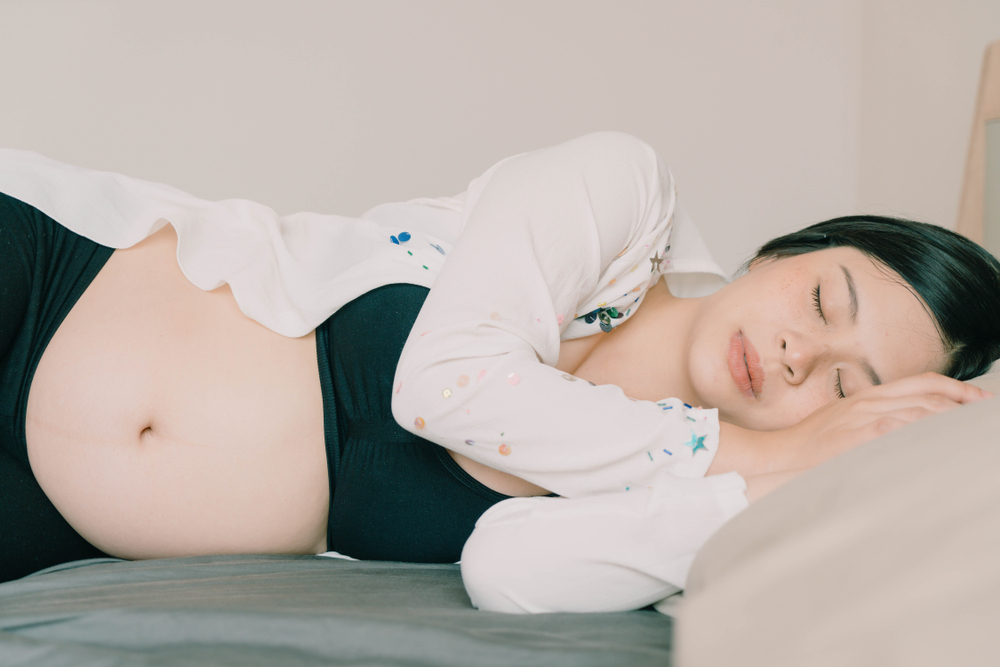
Why Are Pregnant Women Told to Sleep on Their Left Side?

Here's something to expect when you're expecting: hearing the phrase "Sleep while you can" repeated by every person you meet for 40 weeks.
For pregnant mothers, that's easier said than done — especially if they're fond of sleeping on their backs or bellies. Currently, many doctors tell pregnant women to sleep exclusively on their left sides at night. But why? What's so bad about resting on the right or snoozing in a supine position?
Turns out, there's a good medical reason for it, and it involves an unseen Tetris game happening inside every pregnant woman's belly. [18 Ways Pregnancy May Change Your Body Forever]
A prenatal puzzle
As a fetus grows larger and larger throughout gestation, it naturally begins to put more and more pressure on mama's internal organs and blood vessels. It can be annoying or painful when the growing baby plops onto mama's bladder or kicks her in the intestines. But comfort isn't behind the prescription for left-side sleeping. According to Dr. Grace Pien, an assistant professor of medicine at the Johns Hopkins University School of Medicine, the crucial piece of the puzzle is the mother's inferior vena cava (IVC), a large vein that runs along the right side of the spine and is responsible for returning blood from the bottom half of the body to the heart.
"If a pregnant woman is lying on her back, the fetus is more likely to compress the inferior vena cava, decreasing the amount of blood returned to the heart," Pien told Live Science. "There's not a lot of research comparing sleeping on the right and left side, but at least theoretically, you'd also have less potential compression of the IVC on your left side than on your right."
Why is this compression bad? Less blood being pumped into the heart means less blood being pumped out of the heart — and that means a drop in blood pressure for mom, and a drop in blood oxygen content for both mom and baby. (Mom's blood carries oxygen to the baby.) Most healthy women and fetuses should be able to compensate for a slight reduction in cardiac output, Pien said, but IVC compression can become a bigger risk for pregnant women who already have blood pressure problems or breathing complications.
For example, pregnant women with asthma or sleep apnea (a condition in which breathing repeatedly starts and stops at night) may already have trouble delivering the optimal amount of oxygen to their bodies or their babies. When conditions like these are coupled with the reduced blood flow that comes from supine sleeping, the effects could magnify each other in a dangerous way.
Sign up for the Live Science daily newsletter now
Get the world’s most fascinating discoveries delivered straight to your inbox.
"A number of studies have suggested that sleeping on one's back during late pregnancy may be associated with a higher risk for stillbirth," Pien said.
The evidence for this connection is mounting. Most recently, a study published earlier this year in BJOG: An International Journal of Obstetrics and Gynaecology found that women who had a stillbirth after 28 weeks gestation were 2.3 times as likely to have slept on their backs the night before the stillbirth than women with a healthy continuing pregnancy. Another study, published in the journal PLOS One in 2017, found supine sleeping was associated with a 3.7 times higher risk of stillbirth than is found overall. One limitation to keep in mind for studies like these — where people are asked to recall what they did in the past — is something called "recall bias." With recall bias, women who had a bad outcome, such as a stillbirth, are more likely than women with a healthy pregnancy to rack their brains for anything they may have done to cause it.
These alarming trends have been repeated often enough that most doctors don't hesitate to recommend that pregnant women avoid sleeping in the supine position. It is, as Pien put it, "a relatively easy, cost-free intervention" that can potentially prevent some very negative pregnancy outcomes.
What's wrong with right?
So, what — if anything — is wrong with sleeping on the right? That's hard to say, as there haven't been many studies specifically comparing left- and right-side sleeping during pregnancy. One study of 155 women, published in the journal The BMJ in 2011, did find a slightly increased risk of stillbirth in women who went to bed on their right rather than their left the night before they miscarried, but these results have not yet been repeated.
"I don't think there's clear evidence that sleeping on your right is worse than sleeping on your left," Pien said. "If there's a reason somebody is sleeping on their right because they're more uncomfortable sleeping on their left, I don't think there's a reason not to do it."
If you have an otherwise healthy pregnancy and absolutely can't sleep on your left, rolling over to the right is probably nothing to worry about, Pien said. In fact, it might be better for you; not getting enough sleep may be much worse for pregnancy outcomes than the slight risk of IVC compression when lying on your right flank.
"Research suggests that pregnant women who are not getting enough sleep — less than 5 or 6 hours of sleep a night — probably are at increased risk for things like gestational diabetes, and potentially for things like preeclampsia," Pien said. "Getting enough sleep is very important to pregnancy."
Enjoy it while you can.
Originally published on Live Science.

Brandon is the space/physics editor at Live Science. His writing has appeared in The Washington Post, Reader's Digest, CBS.com, the Richard Dawkins Foundation website and other outlets. He holds a bachelor's degree in creative writing from the University of Arizona, with minors in journalism and media arts. He enjoys writing most about space, geoscience and the mysteries of the universe.










